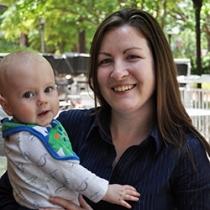
Natalie R. S. Caruso
What is your next adventure? I'll be moving to Washington, DC to work for the Navy Research Lab as a post-doc in electrical propulsion. There will be some experimental and some thermal, but the big area is electrical propulsion. The idea is to eventually transition into a permanent position, and this is one way to do that. My husband [Brent Caruso] is looking into either transferring to DC within his current employer or working remotely.
What are you most looking forward to in your next adventure? There are some areas of my work I won't be able to discuss. I know that already. But I do know I'll have to expand out of electrical propulsion into some areas I've not previously studied, like material sciences. That part's exciting. Right now, the job is year-to-year, but, eventually, it could become permanent, which is what we want. We really wanted [me] to find a job with a future, in an area of the country where we'd like to live and buy a house.
Do you have any previous co-op, internship, or research experience in this area? I worked in Dr. [Mitchell] Walker's lab, focusing on electrical propulsion, while I was here. Through that lab I did some NASA-funded work - the Marshall Ion Ion Thruster (MINT) project. Part of the agreement was that I'd spend a summer at NASA Marshall to set it up, which I did. The thruster is designed to accelerate both positive and negative ions. It's based on the Pegasus Thruster that was first developed at Ecole Polytechnique in France. Originally, it was supposed to be the basis for my dissertation, but , because it's such a new plasma that hasn't been studied in detail, I didn't think I'd have enough history to defend it. Only one source has tested it, and that would give me just once source to cite.
What about your educational experience at GT-AE helped you to achieve your goals? I intentionally chose Georgia Tech because I knew research would not be secondary. When I interviewed with Dr. Walker, I told him my goal as a graduate student was to do experimental research and get a job in a government lab. That's what I'm doing. My one non-research outlet - playing [alto sax] in the Georgia Tech concert band - was the perfect contrast because I love music, and I found it really relaxing. Other than that, I made a conscious decision to not get involved in everything on campus the way I did as an undergraduate - I was captain of the women's varsity tennis team and editor of the paper. I lived on stress then, and I loved it. At Georgia Tech, I didn't see a huge opportunity for me to have that sort of stress and also do the research I came here to do. Research is time-consuming. There's a lot of setting up experiments and waiting for results. You can spend your whole day in the lab, so there's no time to spend on other commitments. Research was my commitment.
What advice would you give someone who wanted to follow in your path? When I was thinking about graduate school, I went to a seminar on how to be a grad student. They kept telling us, 'Your life is on hold in graduate school. You won't get married when your friends do, you won't buy a house when your friends do, you won't have kids..." But my experience was: 'live your life.' We got married while I was at Tech and we had a baby as I was finishing up. It's working out well for us. It's not like I gave up things I really wanted to do. I really wanted to do the research I was doing. We arranged things so I could maximize my involvement in my research, and, now, we're ready for the next step.